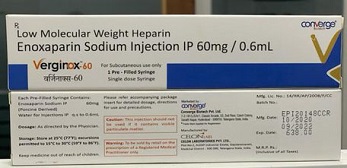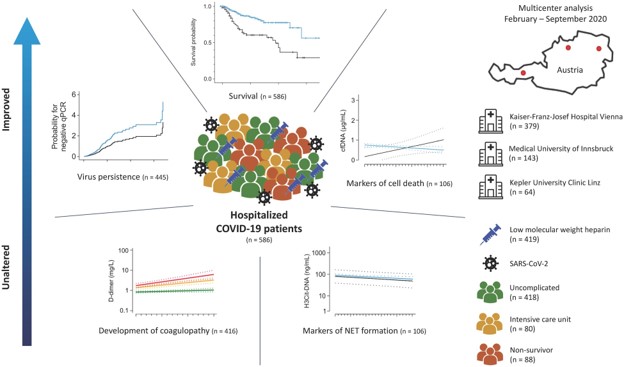Study Reveals That Low Low-Molecular-Weight Heparin Curtails Duration Of SARS-CoV-2 Infection Besides Reducing Disease Severity And Risk Of Mortality
Source: Medical News-COVID-19 Drugs Nov 14, 2021 4 years, 2 months, 5 days, 18 hours, 15 minutes ago
COVID-19 Drugs: A new study by Austrian researchers from the Medical University of Vienna, Kaiser Franz Josef Hospital, University of Innsbruck and the Johannes Kepler University-Austria has found that not only does the anticoagulant-low molecular weight Heparin reduces the risk of disease severity and mortality about those with COVID019 but it also curtails the duration of the SARS-CoV-2
Infection ie reduces duration of viral persistence.

For the study, the medical data of 586 hospitalized COVID-19 patients from three different regions of Austria were evaluated retrospectively. Of these, 419 (71.5%) patients received low-molecular-weight heparin (LMWH) and 62 (10.5%) received non-vitamin-K oral anticoagulants (NOACs) during hospitalization.
Plasma was collected at different time points in a subset of 106 patients in order to evaluate markers of thromboinflammation (H3Cit-DNA) and the cell death marker cell-free DNA (cfDNA).
 Graphical Abstract
Graphical Abstract
The study findings showed that use of LMWH was associated with improved survival upon multivariable Cox regression (hazard ratio = 0.561, 95% confidence interval: 0.348–0.906). Interestingly, neither LMWH nor NOAC was associated with attenuation of D-dimer increase over time, or thromboinflammation. In contrast, anticoagulation was associated with a decrease in cfDNA during hospitalization, and curtailed viral persistence was observed in patients using LMWH leading to a 4-day reduction of virus positivity upon quantitative polymerase chain reaction [13 (interquartile range: 6–24) vs. 9 (interquartile range: 5–16) days,
P = 0.009].
The study findings revealed that time courses of haemostatic and thromboinflammatory biomarkers were similar in patients with and without LMWH, indicating either no effects of LMWH on haemostasis or that LMWH reduced hypercoagulability to levels of patients without LMWH. Nonetheless, anticoagulation with LMWH was associated with reduced mortality, improved markers of cell death, and curtailed viral persistence, indicating potential beneficial effects of LMWH beyond haemostasis, which encourages use of LMWH in COVID-19 patients without contraindications.
The study findings were published in the peer reviewed journal: Cardiovascular Research
. (A Journal of The European Society of Cardiology). https://academic.oup.com/cardiovascres/advance-article/doi/10.1093/cvr/cvab308/6381563
Typically, clotting problems and resulting complications are common in COVID-19 patients.
The study findings have now shown that LMWH, a member of the anticoagulant group of drugs not only has a beneficial effect on survival of COVID-19 patients, but also influences the duration of active infection with the SARS-CoV-2 coronavirus.
The COVID-19 disease is a multifaceted infectious disease. While, at the start of the global pandemic, it was assumed that COVID-1
9 was primarily a disease of the lungs, it is now known that several functional systems in the human body are affected following infection with the pathogen SARS-CoV-2.
Importantly one of these functional systems is blood clotting. COVID-19 patients have an increased risk of thromboses and embolisms, such as strokes, pulmonary or myocardial infarctions, and even deep vein thromboses.
The use of drugs that inhibit blood clotting has been part of the treatment guidelines for COVID-19 since July 2020.
First author, Dr David Pereyra from Medical University of Vienna's Department of General Surgery told Thailand
Medical News, "These complications during hospitalization have a direct impact on the well-being of patients and increased the risk of dying from COVID-19. However, to date the underlying coagulopathy is still not fully understood until these study findings came out.”
Co-researcher Dr Alice Assinger, group leader at the Institute of Vascular Biology and Thrombosis Research at the Medical University of Vienna added, "The coagulopathy observed in COVID-19 patients is novel and differs in many respects from previously known coagulation problems. COVID-19 triggers unique clotting problems. COVID-19-associated coagulopathy displays characteristics that, although partially comparable with other coagulation diseases, cannot be fully explained by them. This is what propelled our study team to look for an explanation for this sub-condition of COVID-19 in the spring of 2020, in an early phase of the pandemic.”
The
COVID-19 Drugs study team observed in a multi-center analysis of COVID-19 patients in Vienna, Linz and Innsbruck, that COVID-19-associated coagulopathy occurs almost exclusively in patients requiring intensive care or in patients who die as a result of COVID-19.
Despite the fact that anticoagulant drugs improve the survival of COVID-19 patients, they show no effect on immunological processes related to blood coagulation (immunothrombosis).
Surprisingly, the detailed analyses showed that the period of active SARS-CoV-2 infection is curtailed in patients treated with low-molecular-weight heparin, the most commonly used anticoagulant.
Dr Pereyra further added, "Surprisingly in patients who receive this drug, infection time is an average of four days shorter than in patients who are not treated with low-molecular-weight heparin. We were surprised to see that low-molecular-weight heparin may have a direct effect on coronavirus and its infectivity and the study findings show that low-molecular-weight heparin or LMWH curtails duration of SARS-CoV-2 infection.”
Additional experimental data also showed that heparin can inhibit the ability of SARS-CoV-2 to bind to cells, thereby preventing them from being infected.
The study team concluded, “Taken together, the present investigation confirms an association of anticoagulants with improved survival of COVID-19 patients in a large Central European Multicentre Cohort and suggests a beneficial effect of LMWH use on SARS-CoV-2 viral persistence. While the exact pathomechanisms underlying these observations cannot be investigated due to the retrospective observational study design, the present study encourages the evaluation of viral persistence in randomized controlled trials assessing the effect of LMWH in COVID-19 patients in order to establish a causal relation of the presented findings. Limiting viral persistence, thereby shortening hospitalization and contagiousness is a relevant aspect during this pandemic.”
For the latest on
COVID-19 Drugs, keep on logging to Thailand Medical News.

